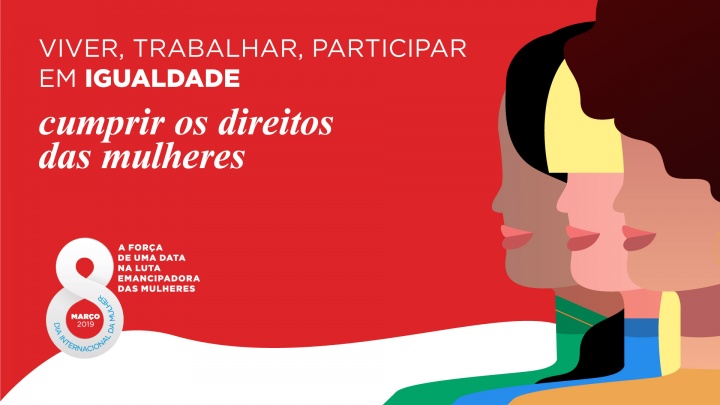We wanted to commemorate the 8th of March in Almada, and so I want to salute all the women present, and through them all the women in the county. But we also want to dedicate a special salutation to the women working in for this municipality, for their struggle in defense of a 35-hour work week and the recovery of a full Christmas Subsidy (after six years of cuts), a struggle that continues, for better wages, job careers and a better life. A struggle that counts on and will count on PCP.
They can also count on PCP when commemorating International Women's Day, a date closely tied with the women's struggle for equality in life and their emancipation.
An attitude that always naturally characterized CDU when leading this City Hall. An attitude that contrasts with that of the Socialist Party (PS). One of the first decisions of their term was the cancellation of an initiative held by the county since April [Revolution of 1974] and the institution of Local Power: the March 8th lunch paying due homage to the municipal workers and in particular the women workers.
This is one example closely tied to the regressions registered during this term at the municipal level, warranting our expression “With PS, Almada loses”. Women lose support in their specific struggles, in a county of deep democratic and progressive traditions. Workers lose in their trade-union rights, following the lay-off of 51 cleaning workers. The county's population loses.
With PS, with a female Mayor, the March 8th municipal lunch was canceled. This is a very concrete example that merely having women in this or that office won't change policy. The central issue is not who holds the public office, but what policy is followed.
However they seek to erase us, there is no reversal that can shake our determination to continue serving the people of this country, there is no setback that can erase or diminish the work completed, the many years of dedication by consecutive groups of men, women and youngsters of CDU, who built Almada into a city and County of a cultural and human dimension that can not be ignored.
We reaffirm our commitment to fight for an Almada of progress, that honors its democratic and combative traditions, that doesn't admit reversals in the quality of its public services.
Throughout the country, PCP is addressing a message to women reaffirming its commitment to fight for a new policy that ensures the rights of women as workers, citizens and mothers, because that is the necessary condition for them to live, work and participate with equality in all spheres of life, while also giving them the confidence to assume themselves as protagonists in the changes they desire for their lives.
In the year marking the 45th anniversary of the April Revolution, we need to value its significance, what it meant in terms of conquering women's rights never before achieved. In a short period, gigantic steps were taken in eliminating discrimination, enshrining equality into law and creating conditions to further the transformation of their social condition and status.
The nature of the economic and social choices of consecutive right-wing policy governments —by PS, PSD [Social Democratic Party], and CDS [Popular Party]— inverted the path of April, transforming Portugal into a more unequal, peripheral and dependent country, deepening labor exploitation and discrimination against women, clearly seen in labor precariousness; work schedule deregulation; lower wages and social benefits; degradation of their social-professional status; complicity in infringing breast-feeding, maternal and paternal rights; obstacles raised to young couples and their right to decide when and how many children they want; in the absence of effective measures to prevent and combat domestic violence. They can not hide that right-wing policies by successive governments are responsible for the divide between law and life. Without fulfilling and practicing rights, there is no equal participation. The women's struggle assumes a determinant role in defense of their rights and for a new path for the Country.
The March 8th commemorations give strength to the women's struggle taking place everyday. Therefore we appeal for participation in the National Women's March, promoted by MDM [Democratic Women's Movement], on March 9th, at 14h30, from Restauradores to Ribeira das Naus [in Lisbon].
We live in a time when it is necessary to recall the historic origins of International Women's Day. Its proclamation in 1910 was part of a new historic stage of the women's struggle for their social emancipation, where the worker's and revolutionary movement assumed the flag of the struggle for social equality between women and men in life and work.
The commemoration of this date arose from the need to give greater strength to women's organized struggle, consistently and continuously, for precise objectives, be they immediate or more long-term. A struggle for specific demands of women workers, which was not isolated from the more general struggle in each country. And with the perspective of the women's struggle for their social emancipation.
International Women's Day became a inescapable symbol, an integral part of the women's struggle for their rights, part of a more general struggle of workers and peoples, which led to extraordinary advances in the 20th century, among which achieving equality between women and men in several capitalist countries.
In contrast, in the present, governments, European and international bodies at the service of big capital and the capitalist system elect “gender equality” as their “flag”, aiming to hide that the capitalist system proclaimed the inferiority of women, in the law and in life, assuming the preceding backwards conception of a system divided into social classes. They hide that their “gender equality” is deprived of any perspective of transforming the social condition of the large mass of women the capitalist systems exploits, oppresses and seeks to alienate.
All this in a context of further attempts to manipulate this date, by forces that domestically converge with international forces who aim to emerge with apparently radicalized forms of struggle and causes.
Actually, these are further steps in the political and ideological offensive that aim to forge a “feminine identity” deprived of social, class and political conspicuousness, removing women from their role as active subjects in the struggle against those who exploit and discriminate them, and foster the normalization of violence. It is an attempt to subvert the organized struggle of women, which happens every day, and not only once a year, fostering false divisions between workers in terms of gender, aiming to break class unity in the common struggle against the true oppressor —big capital and the governments subordinated to big capital.
Therefore, allow me to also highlight on this International Women's Day, some central aspects of the present for the women's struggle.
April must be fulfilled in women's lives. With the April Revolution came the abolition of an inferiority status imposed by fascism, which denied women their most basic civil, social and cultural rights —in the family, in the workplace, the right to education, sexual and reproductive health, to social security, to social and political participation.
But the economic and social choices of successive right-wing governments and the integration of Portugal in the European Union have inverted the path of April, rather promoting and reproducing the mechanisms of double exploitation, inequality and discrimination of women, in the workplace, at home, in social and political life. Over the last years, PS, PSD and CDS have fostered false policies of equality they have not fulfilled: neither in terms of reconciling women's family and professional life; nor promoting birth rate; or fighting against domestic violence; not even in promoting wage equality.
With the new correlation of forces in Parliament, PCP has not wasted any opportunity to restore, defend and conquer rights that allow advances for workers, the people and the Country, and to elevate the living conditions of women.
In fact, in several areas, it was possible to have gone further. But, on the one hand, the worker's and people's struggle achieved the defeat of PSD/CDS in the legislative elections of 2015, which interrupted the objective of furthering their policy of exploitation and impoverishment. And, on the other hand, PCP had a the decisive role in achieving advances, in several matters forcing the PS minority government to go well beyond its governmental program.
But the present government did not break with its structural options, either with the interests of big capital or the European Union guidelines that don's allow the country to resolve its problems. False promises of equality directed towards women won't ensure equality in women's lives. Only by breaking with right-wing policies can one fight the persistent divide between the law and life.
Women's rights will only become effective with a new policy rooted in the values and achievement of the April Revolution. PCP bears solutions for the future, anchored upon a patriotic and left-wig policy, whose central pillars fight exploitation and inequalities, and violence against women. From it, a new policy of equality emerges, based on fulfilling women's rights in a more just society for all.
In a year with important elections, women must take their struggle, their aspirations and rights to the ballot box.
We must take the side of solutions for the future, electing women and men from PCP and th forces integrating CDU, to further women's rights in Portugal and Europe.
More strength for CDU in the European Parliament is support for who has a proven record in giving voice to workers, people and Country and the struggle against reversals in women's rights, resulting from EU guidelines that subordinate governments from different countries, such as Portugal.
More strength for CDU is the firm path towards a commitment to make women's rights effect, within the framework of a new policy rooted upon the values and achievement of the April Revolution, for a more just Portugal, with progress and sovereignty, where women and the Country overcome.




